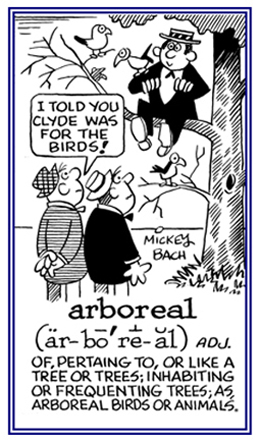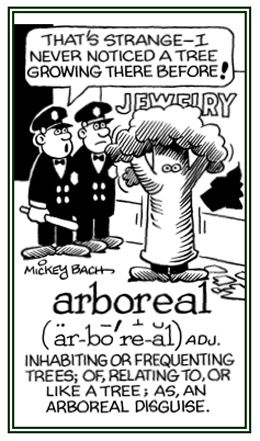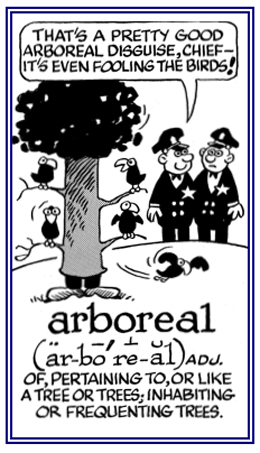arbor-, arbori-
(Latin: tree, trees)
If you would know strength and patience, welcome the company of trees.
Urban Development is cutting down trees and naming streets after them.
arbor (s), arbores (pl); arbour (British)
1. A leafy, shady recess formed by tree branches, shrubs, etc.
2. A latticework bower intertwined with climbing vines and flowers.
3. A trellis or other structure used to support plants that form an arbor.
3. A grass plot; lawn; garden; orchard.
4. A bar, shaft, or axis that holds, turns, or supports a rotating cutting tool or grinding wheel, often having a tapered shank fitting tightly into the spindle of a machine tool.
2. A latticework bower intertwined with climbing vines and flowers.
3. A trellis or other structure used to support plants that form an arbor.
3. A grass plot; lawn; garden; orchard.
4. A bar, shaft, or axis that holds, turns, or supports a rotating cutting tool or grinding wheel, often having a tapered shank fitting tightly into the spindle of a machine tool.
arbor vitae, arborvitae
1. Any of several North American or eastern Asian evergreen trees or shrubs of the genus Thuja, having flattened branchlets with opposite, scalelike leaves and small cones.
They are grown as ornamentals and for timber.
2. The white nerve tissue of the cerebellum, which has a treelike outline in a median section.
arboraceous (adjective), more arboraceous, most arboraceous
1. Abounding in trees: The house that Jill and Thomas bought was next to a huge arboraceous or wooded area with lots of wild animals.
2. A reference to a tree-like or wooded characteristic: The picture that little Sally drew showed arboraceous shapes with blue clouds and a sun!
2. A reference to a tree-like or wooded characteristic: The picture that little Sally drew showed arboraceous shapes with blue clouds and a sun!
arboreal (adjective), more arboreal, most arboreal
1. Relating to or resembling a tree or trees: The arboreal protection in the park provided lots of shade for the picnickers.
2. Pertaining to a habitat in trees, such as birds or animals: There are arboreal apes, gibbons, and squirrels among other arboreal creatures.
3. Descriptive of an adaption for life in trees: Sam and Mary discovered a variety of arboreal birds which were living in the trees down by the river.

© ALL rights are reserved.

© ALL rights are reserved.

© ALL rights are reserved.
Go to this Word A Day Revisited Index
2. Pertaining to a habitat in trees, such as birds or animals: There are arboreal apes, gibbons, and squirrels among other arboreal creatures.
3. Descriptive of an adaption for life in trees: Sam and Mary discovered a variety of arboreal birds which were living in the trees down by the river.



Go to this Word A Day Revisited Index
so you can see more of Mickey Bach's cartoons.
arborean
1. A reference to a tree or trees.
2. Of the nature of trees.
2. Of the nature of trees.
arboreous
1. Relating to or resembling a tree.
2. Living in trees; arboreal.
3. Having many trees; wooded.
4. Forming a tree trunk, as distinguished from a shrub.
2. Living in trees; arboreal.
3. Having many trees; wooded.
4. Forming a tree trunk, as distinguished from a shrub.
arboreous desert
An area of sparsely scattered trees with little or no vegetation between; a desert forest.
arborescence
The state of being arborescent; the resemblance to a tree in minerals, or crystallizations, or groups of crystals in that form; as, the arborescence produced by precipitating silver.
arborescent
Having the size, form, appearance, or characteristics of a tree; treelike; branching.
arboresque (adjective), more arboresque, most arboresque
1. Artistically similar to a tree; tree-like.
2. Resembling a tree in form and branching structure.
2. Resembling a tree in form and branching structure.
arboret
A small tree or shrub.
arboretum (s), arboreta (pl)
1. A place where an extensive variety of woody plants are cultivated for scientific, educational, and ornamental purposes.
2. A laboratory for developing new varieties of trees and shrubs of special beauty, or faster growth, or resistance to pests and diseases; and to experiment with trees from foreign lands to discover their uses and adaptability to local climates.
3. A living museum where people can see and learn about trees and a place of beauty during every season.
4. A botanical garden exhibiting trees for their scientific interest and educational value, and in association with appropriate wildlife features.
2. A laboratory for developing new varieties of trees and shrubs of special beauty, or faster growth, or resistance to pests and diseases; and to experiment with trees from foreign lands to discover their uses and adaptability to local climates.
3. A living museum where people can see and learn about trees and a place of beauty during every season.
4. A botanical garden exhibiting trees for their scientific interest and educational value, and in association with appropriate wildlife features.
An arboretum is a place for the cultivation, study, and enjoyment of trees; while a nursery is a place for raising trees to use elsewhere in landscaping and forestry.
arborical
Relating to or formed by trees.
arboricide
1. The wanton destruction of trees.
2. A chemical that kills trees.
2. A chemical that kills trees.
arboricole (verb), arboricoles; arboricoled; arboricoling: trees
1. To live predominantly in trees or large woody shrubs.
2. Etymology: from French arboricole which came from Latin arbor, "tree" + colere, "to inhabit".
2. Etymology: from French arboricole which came from Latin arbor, "tree" + colere, "to inhabit".

